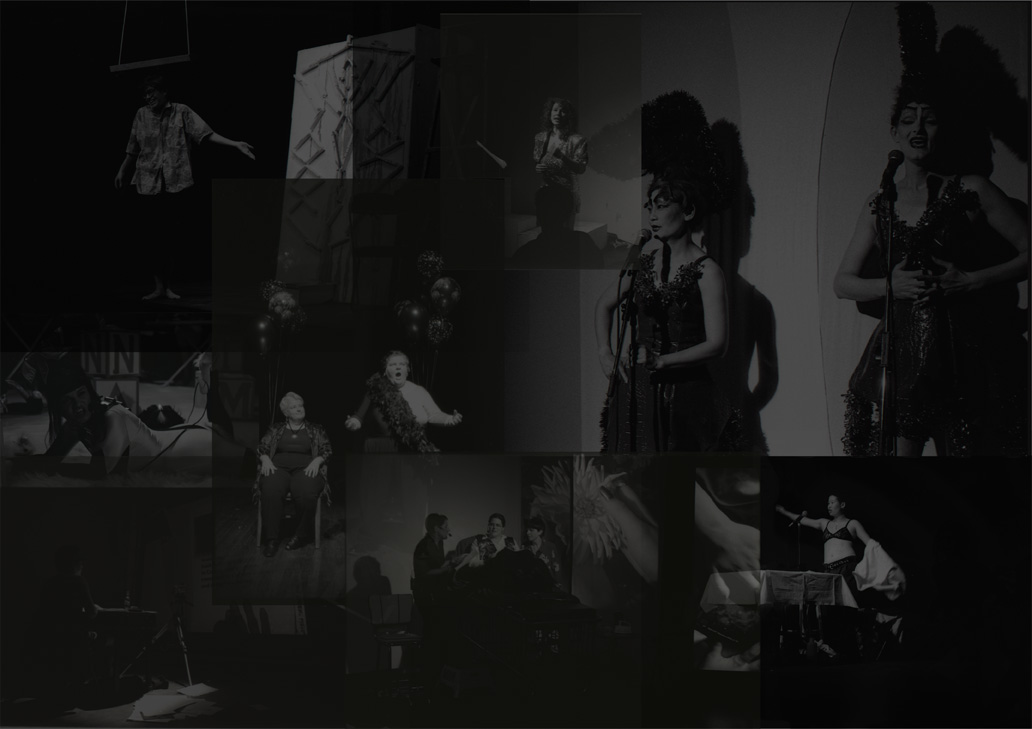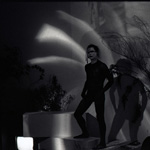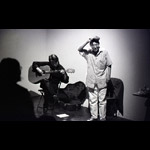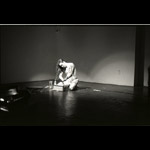(queer) intersections:
intersecting identities
"As much as choosing a name says who we are, who we are as a person [is] much as we view the world in its wholeness"
- A. Maracle, Gender Möbius (1995)
One of the major concerns of artists in this period was to express the complexity of identity as a series of intersecting experiences, histories, places and politics. For many, stereotypes and categories of naming based exclusively on race, gender or sexuality were found limiting and, in their narrowness, often seen as committing a kind of violence on the individual. The works in this section explore identity as a complex process of identification and transformation.
All videos require the free QuickTime plugin (external link)
Aiyyana Maracle, Gender Möbius (1995)
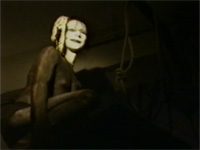 Aiyyana Maracle's Gender Möbius (1995) frames a personal journey - from "ugly Indian boy" to a person beyond labels - within the violent narrative of the conquest of the 'Americas'. It is this history, but ultimately the wisdom of Native women, which allows Maracle to make the leap, literally, into life as a transgendered individual.
Aiyyana Maracle's Gender Möbius (1995) frames a personal journey - from "ugly Indian boy" to a person beyond labels - within the violent narrative of the conquest of the 'Americas'. It is this history, but ultimately the wisdom of Native women, which allows Maracle to make the leap, literally, into life as a transgendered individual.
Video for high speed connections 30:00/198MB
Video for slow connections 30:00/13.9MB
Jamila Ismail, Damon Nomad (1991)
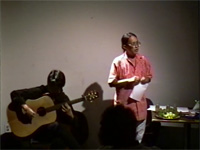 Drawing on her family history as East Indian-Hong Kong Chinese, Jamila Ismail experiments with text, rhythm, musical accompaniment, and projected imagery in Damon Nomad (1991), a kind of interdisciplinary poetics about diasporic experience, shifting identities and the meaning of home.
Drawing on her family history as East Indian-Hong Kong Chinese, Jamila Ismail experiments with text, rhythm, musical accompaniment, and projected imagery in Damon Nomad (1991), a kind of interdisciplinary poetics about diasporic experience, shifting identities and the meaning of home.
Video for high speed connections 52:03/344MB
Video for slow connections 52:03/22.8MB
Archer Pechawis, Halfbred (1995)
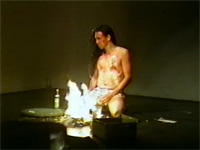 Archer Pechawis describes the "messy connective tissue" of hybrid identity in Halfbred (1995), a tightly choreographed work about trying to find the racial line between 'Indian' and 'White'. Using text, pop song, slide imagery and a ritual with fire and earth, Pechawis moves beyond the definitions of Indian-ness used for the convenience of dominant white culture.
Archer Pechawis describes the "messy connective tissue" of hybrid identity in Halfbred (1995), a tightly choreographed work about trying to find the racial line between 'Indian' and 'White'. Using text, pop song, slide imagery and a ritual with fire and earth, Pechawis moves beyond the definitions of Indian-ness used for the convenience of dominant white culture.
Video for high speed connections 24:52/172MB
Video for slow connections 24:52/10.8MB
Warren Arcan, Orpheus (1993)
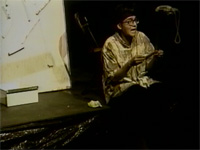 Orpheus - Warren Arcan's performance for the Two Spirit Series, deals explicitly with physical, sexual and gender violence. It is a story of rape and bullying where the artist is complicit in the infliction and disavowal of violence and where suffering is visualized as an abstract figure that bleeds in the background.
Orpheus - Warren Arcan's performance for the Two Spirit Series, deals explicitly with physical, sexual and gender violence. It is a story of rape and bullying where the artist is complicit in the infliction and disavowal of violence and where suffering is visualized as an abstract figure that bleeds in the background.
Video for high speed connections 8:06/3.8MB
Video for slow connections 8:06/69MB
